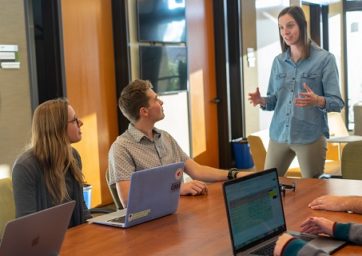Request Information
Ready to find out what MSU Denver can do for you? We’ve got you covered.
Program Educational Objectives
Educational objectives describe the career and professional accomplishments that the program is preparing graduates to achieve.
The MSU Denver Computer Science program enables its graduates to become:
The objective of the minor is to produce graduates who have knowledge of programming techniques, upon which they build understanding in at least one other knowledge area from among those listed for the major.
The objective of the service courses is to teach specific programming languages, operating systems, environments, and other specific knowledge. They are to serve the community, other programs within the University, and majors and minors, by teaching application-area-specific knowledge to students.
The overall objective of the Computer Science faculty is to successfully implement the Computer Science major. In order to do this, the faculty have the objectives of successfully teaching a variety of courses, using current technology, giving students hands-on experiences, renewing their professional skills and knowledge base, sharing activities and knowledge with other professionals, and regularly reviewing and updating curriculum based on professional organization guidelines and both student and advisory board input.

Student Outcomes
By the time of graduation, graduates of the program will have an ability to:
Each of these Outcomes (1-6) are supported by specific knowledge & skills defined as “Performance Criteria” included in the official course syllabi. The performance criteria from the course syllabi are correlated with the Outcomes, 1-6 to ensure that each of these high-level Student Outcomes is supported by course work.